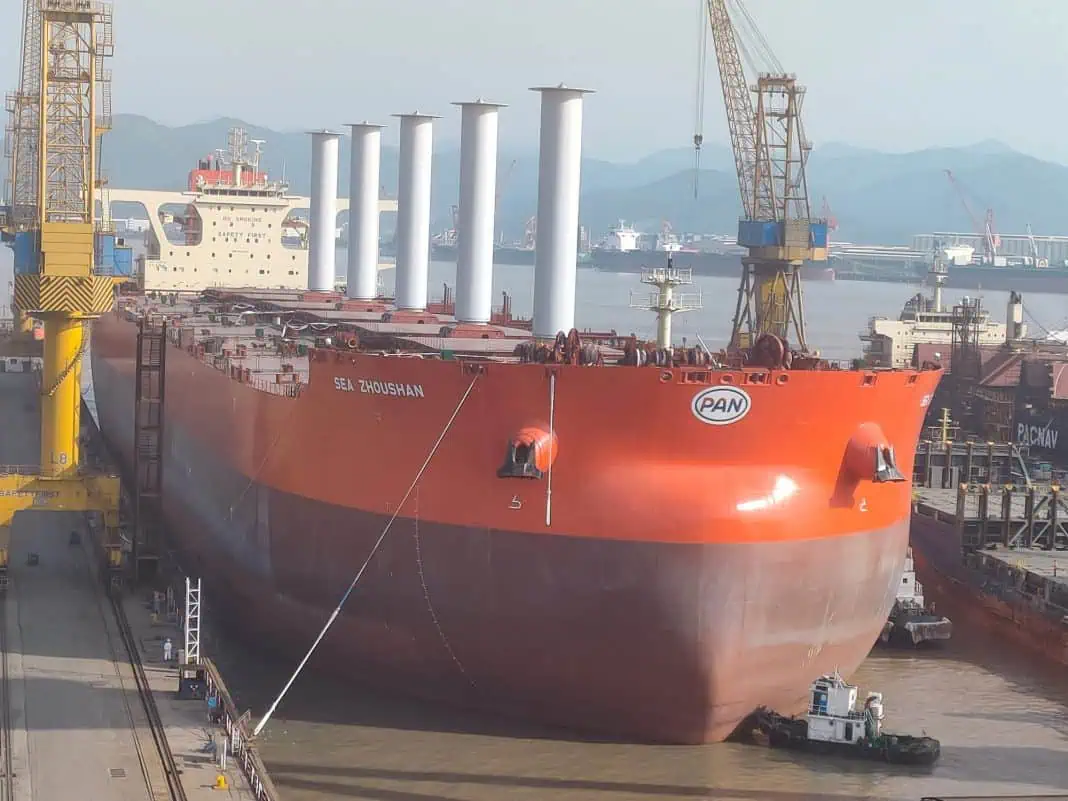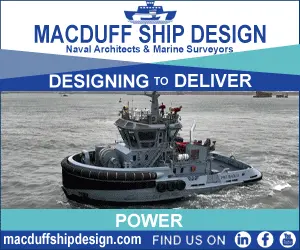Norsepower Oy Ltd., the leading global provider of auxiliary wind propulsion systems, today announced the installation of five tilting Rotor Sails on board a new-build Very Large Ore Carrier (VLOC) chartered by Vale, the Brazilian mining company. The first installation of Norsepower’s innovative Rotor Sails on a bulk carrier demonstrates the adaptability of the technology to reduce fuel consumption, fuel costs and reduce emissions across a variety of vessel types.
The new vessel, a 325,000 dwt VLOC is owned by Pan Ocean Ship Management and will be chartered by Vale after construction is completed in China. To enable efficient cargo operations, the five 24m high and 4m diameter Rotor Sails can be tilted by using hydraulic cylinders.
With growing international and public pressure on the maritime industry to move towards decarbonising their operations, the ability to harness the wind to generate thrust, reduce fuel consumption and emissions, is a natural next step is becoming an increasingly viable option to meet imminent regulatory drivers such as EEXI and CII ratings.
Norsepower has analysed the routes for the vessel chartered by Vale and estimates that its technology would be able to achieve an efficiency gain of up to 8% and a consequent reduction of up to 3,400 tons of CO2 per year.
Commenting on the installation, Tuomas Riski, CEO, Norsepower, said: “We are delighted to be working with Vale, and supporting them to maximise the propulsive power of wind to reduce carbon and other emissions as well as protecting the sustainability of its value chain more broadly.
“The five tilting Rotor Sails will allow Vale to maintain flexible cargo operations while also saving fuel and emissions. Installing our Rotor Sails on the first VLOC demonstrates that our technology is adaptable across varied operational profiles and vessel types. As vessel operators and charterers strive to decarbonise, the value of wind propulsion for both a retrofit and newbuild vessels is undeniable. The Rotor Sails can reduce a vessel’s Energy Efficiency Design Index (EEDI) and future-proof vessels against impending IMO Greenhouse Gas regulations as well as against inevitable fuel price increases as new fuels enter the market.”
Rodrigo Bermelho, Shipping Technical Manager, Vale, added: “We are committed to supporting the adoption of clean technology solutions for shipping to ensure that Vale’s sustainability objectives are achieved. Installing five Rotor Sails will maximise our fuel and emissions savings. We are working with Norsepower to ensure this new build is as environmentally friendly as possible and can achieve significant reductions in fuel consumption and CO2 emissions. If the pilot proves effective, it is estimated that at least 40% of the fleet will be able to use the technology, which would result in a reduction of almost 1.5% of Vale’s annual iron ore maritime transport emissions.”
The Norsepower Rotor Sail is the first third-party verified and commercially operational auxiliary wind propulsion technology for the global maritime industry. The solution is fully automated and detects whenever the wind is strong enough to deliver fuel and emission savings, at which point the Rotor Sails start automatically.
Photo credit: Vale












